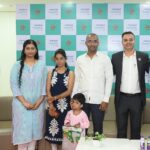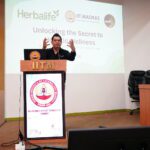- “Leif Johansson, Non-Executive Chairman of the Board, AstraZeneca PLC visits India to expand AstraZeneca’s commitment to healthcare and innovation in India
- AstraZeneca announces finalists of the Unnati Healthcare Innovation Challenge and joins hands with NASSCOM on healthcare accelerator programme”
Healthy Soch
New Delhi, February 21, 2019:
Leif Johansson, Chairman of the Board, AstraZeneca Plc during his three day visit to India, announced a mile-stone expansion of the company’s strategic collaborations to address the rising burden of Non-Communicable Diseases(NCDs) in India. The new partnerships with Indian and Swedish partners aspire to the ambitions of the India-Sweden Innovation Partnership for a Sustainable Future, as agreed upon last year by Indian Prime Minister Modi and Swedish Prime Minister Löfven. Taking advantage of the new opportunities created by the Digital India initiative, they aim to create new innovative solutions for patients with diseases such as asthma, diabetes and cancer in India and beyond.
At the India-Sweden Unnati healthcare 2.0 day, the company and its partners, Business Sweden, The National Association of Software and Services Companies (NASSCOM), Atal Innovation Mission-Niti Aayog and AGNIi, announced the finalists of the Unnati Healthcare Innovation Challenge. At the same time, AstraZeneca launched a strategic partnership with the NASSCOM IoT Centre of Excellence to set up an accelerator programme to support Indian start-ups develop new innovative solutions to NCD care in India and beyond.
Unnati is based on the spirit of India Sweden Joint Declaration on Innovation Partnership for Sustainable Future to create on-the-ground collaboration through user-case driven innovation challenges. The Unnati Healthcare Innovation Challenge, a first of its kind, was launched in November 2018 to accelerate innovative technologies that can provide affordable and accessible solutions for early screening and management of NCDs such as remote screening methods, point of care diagnostics and digital solutions that enable efficient data capture.
As part of this challenge, 90+ healthcare start-ups participated from all over India. The finalists were invited to present their ideas at the Unnati Healthcare 2.0 day. The selected winners among the finalists will be receiving mentorship support from AstraZeneca, which will contribute its unique healthcare domain expertise with the aim of helping the finalists bring their solutions to market.
AstraZeneca also signed a Memorandum of Understanding with NASSCOM- Centre of Excellence, Internet of Things for a Health Tech Start-up Accelerator Programme and Incubation Centre in Bangalore. NASSCOM – CoE IoT was launched as part of Government of India’s Digital India Initiative to help the country achieve a leadership role in the convergent areas of hardware and software. Under this collaboration, AstraZeneca and NASSCOM will incubate start-ups in bringing innovative and frugal solutions that can help in the management of NCDs. Selected startups will have access to NASSCOM’s innovation labs, development resources, cloud services and mentoring support from NASSCOM and AstraZeneca including the opportunity to showcase their innovations in national and global platforms where the latter can showcase their products or services. This opportunity will be open for companies or individuals who are working in the therapeutic areas like diabetes, cardiovascular, cancer/ oncology or respiratory with special focus on thematic areas such as digital solutions, diagnosis and devices.
Commenting on these initiatives, Leif Johansson, Chairman of the Board, AstraZeneca PLC said, “As a science-led organisation, AstraZeneca is committed to strengthen innovation in healthcare in India. We are pleased to collaborate with the government, start-up eco-system and industry partners to achieve the shared vision of making meaningful interventions in improving the lives of patients impacted by Non-Communicable diseases in India.”
Echoing similar sentiments, Debjani Ghosh, President, NASSCOM said, “Technologies such as Predictive Analytics and the Internet of Things (IoT) are shaping the future of healthcare. Recording and analyzing data and utilization of emerging technologies such as AI, cloud and big data has also been instrumental in providing a boost to healthcare. As a leading pharmaceutical company, AstraZeneca has been doing commendable efforts in creating awareness about NCDs (Non-Communicable Diseases) and breakthrough innovations in this field. We are pleased to collaborate with them to set up an accelerator programme at the NASSCOM Centre of Excellence for IoT in developing groundbreaking solutions to improve NCD care in India. Under this partnership, selected startups will have access to hardware innovation labs, development resources and mentors from NASSCOM and AstraZeneca who will guide them in this endeavor.”
Mr. Carsten Grönblad, Trade Commissioner of Sweden to India, said “UNNATI is a model for co-innovation allowing industry, startups and the civil society to jointly develop solutions addressing global social needs. This challenge calls for collaboration to implement early- and remote screening as well as efficient, AI-based patient management. This is an important task as we see the prevalence of non-communicable diseases rise globally. We are happy to partner with AstraZeneca, AGNIi and Atal Innovation Mission – NITI Aayog, with a shared vision of providing affordable and accessible healthcare”







